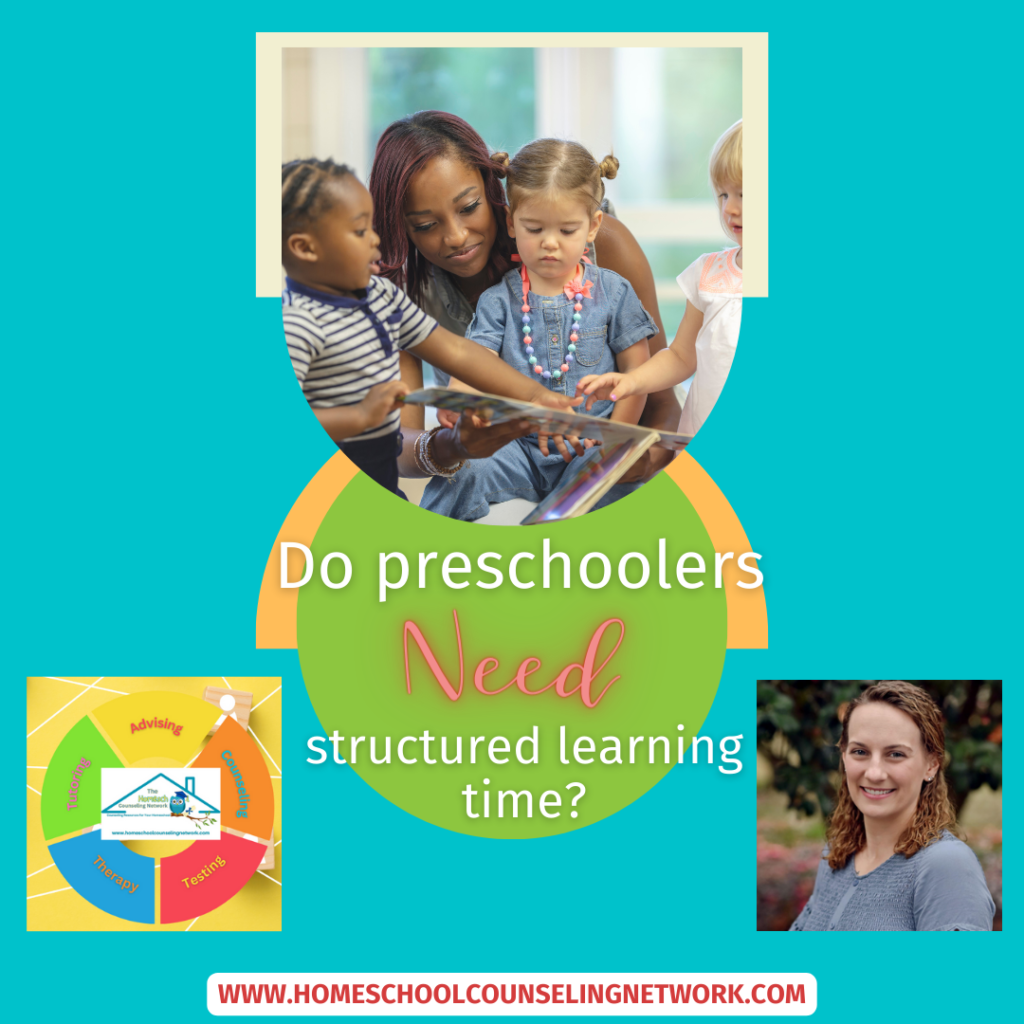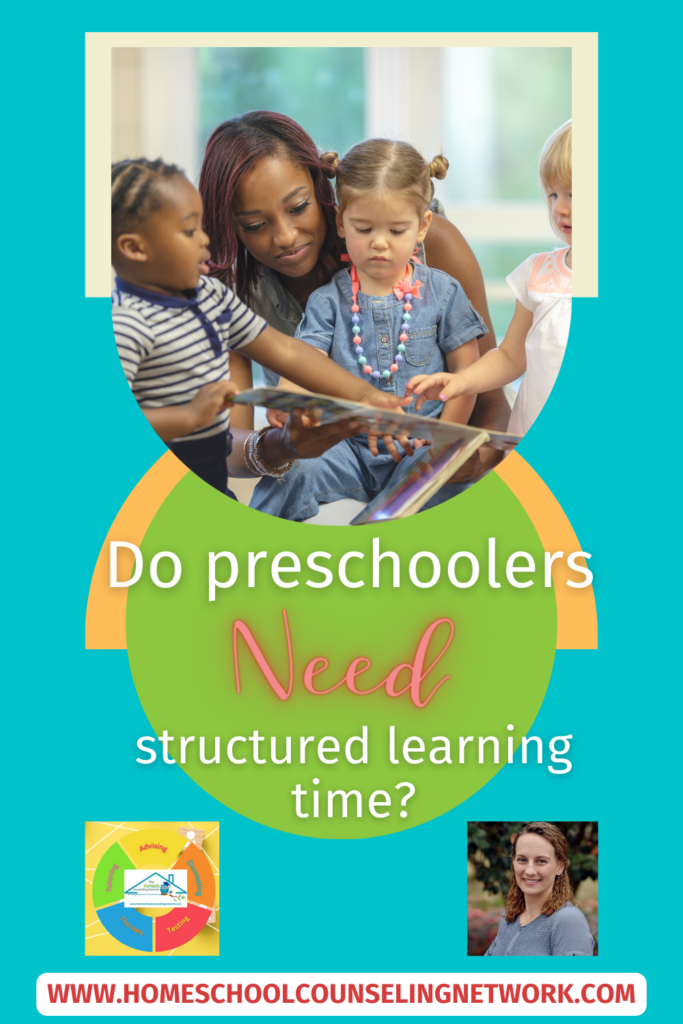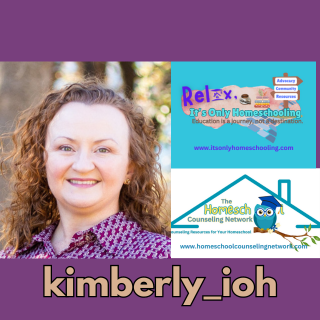The Benefits of Structured Learning Time When Homeschooling Preschoolers

Many families choose not to plan structured learning time for their preschoolers.
There are various reasons including the mindset that this age should only play and be left alone to their own devices. Some families, with multiple kids, find it easier to plan a curriculum for only their older children, usually grades one and up. For the younger kiddos, specifically ages 3-5, planned learning time is overlooked because the older children’s lessons are more important.
I agree that older siblings’ lessons are important and that ages 3-5 are a time for play. However, I also believe these ages can greatly benefit from structured learning time specifically built for them. When designed for them it is play and that is what makes the learning so great.
Parents should not miss the opportunity that structured preschool at home offers. These include the development stage they’re in, setting home learning expectations early, and learning to take ownership of their lessons. Also, I share how to weave it into your already busy schedule.
A Unique Time In A Child’s Development
Ages 3-5 is an interesting time in a child’s development. They believe the world revolves around them! Setting boundaries and expectations will help them, and your family, navigate this time. Also, if older siblings are receiving different treatment, your preschooler will notice and may become confused because they believe everyone’s focus should be on them.
Structured learning time takes away the frustration for you and your child during this phase of development. Offering them a specific activity that is theirs appeases their infantile belief healthily. While having specific expectations during the structured learning time supports their growth out of this mindset.
Set Expectations Early
If you can hook a child early on with purposeful play they will willingly fall into the schedule and expectations you set. The activities must be fun, interesting, and play-based to have this be successful. Then, as they mature, the lessons can slowly change to be a little more rigorous and less playful.
I found this with my eldest. We were able to transition from his preschool curriculum into lessons that included handwriting and phonics seamlessly. Fun lessons remained, including science experiments and art. But the “it’s time to do lessons,” expectation was already set in place.
Teach Ownership Early
A preschooler taking pride in their lessons and learning… sounds like a funny concept. However, in our house, it’s not at all. My preschooler will ask to do his lessons daily. No, he’s not thinking about what he could learn, but he is associating lessons as being positive and fun experiences. Leading him to seek out that time which will pay off in the future.
My eldest, and my current preschooler, both have excitedly shown their grandparents and told random strangers about their lessons. Even though the strangers have no idea what they’re talking about, a 3-year-old’s excitement is infectious and the stranger happily nods along as my 3-year-old tells them about his most recent activity.
How To Provide Structured Learning Time
The first issue most families face is time. However, most preschool lessons only require 30 minutes and a few days a week. Plan to either involve older siblings in your preschooler’s lesson or have them work on their independent lesson nearby. My kindergartener is either completing a writing lesson or just as excited about the activity my preschooler is doing for the day.
If a younger sibling/baby is in the house, plan to complete your preschooler’s lesson during nap time. Also, consider breaking a lesson up if it does not all need to be completed consecutively. This can allow for the younger sibling to participate in a part of a lesson with the flexibility to complete the remaining portion, which may be more difficult, later while they sleep.
Choose a curriculum.
No, it does not need to be expensive but it should take away any frustration. No more random activities that do not correlate or scrambling to assemble all the supplies.
2 things to look for in a curriculum:
- Play-based – your child should be excited about the activities.
- Flexible – it should adapt to your family’s ever-changing season of life.
The perfect time to set home learning expectations and teach your child to take control of their learning is during this unique development stage. If you’re feeling inspired to create a special learning time for your preschooler, check out the entirely free curriculum I created for my boys at www.playingforhours.com.

What Is Playing For Hours?
It’s Letter of the Week like you’ve never seen before, reimagined for all the possibilities that home learning has to offer. The program covers all 26 letters, and each letter centers around a single word with activity ideas, coloring pages, engaging printables, and book suggestions to completely captivate your child in that word theme.
During Aa is for Apple, you’ll find activity suggestions and printables that use apples in science, art, baking, math, and more. Coloring pages include both the upper and lowercase letters and, you guessed it, apples! Book suggestions are focused around apples and orchards whether they’re silly, Ten Apples Up on Top by Dr. Seuss, or educational, Apple Cider Making Days by Ann Purmell.
Week to week. Home to home. Letter of the Week looks different because it’s designed to be flexible and adapt to your schedule and family size. This way your budding student will not be left out and can be given the opportunity early to take ownership of their learning.

Want to Write for Us?
Learn more about how you can become a guest blogger for The Homeschool Counseling Network here.
Let’s Keep In Touch
Be sure you do not miss a blog post by signing up for our newsletter or joining our Facebook group.
Blessings,
Kimberly Bennett, LPC
Founder/CEO It’s Only Homeschooling
Founder/CEO The Homeschool Counseling Network

This website is not a professional counseling website and nothing here should be construed as professional counseling advice. Although Kimberly Bennett, LPC is a Licensed Professional Counselor, she is not your counselor, and no counselor-client relationship is established unless she has signed an agreement with you. All information provided through this website is for informational and educational purposes only.